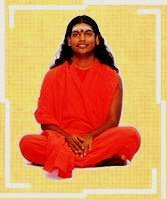Following Nithyananda article first appeared in Common Ground, a Canadian online publication. [external link] IN LIFE, we constantly create either shafts of pain or joy. Once you create a shaft of pain, you try to break it. In the same way, if you create a shaft of joy, you try to elongate it. But you don’t understand that you can neither elongate the joy shaft nor break the pain shaft – simply because the shaft itself doesn’t exist.
IN LIFE, we constantly create either shafts of pain or joy. Once you create a shaft of pain, you try to break it. In the same way, if you create a shaft of joy, you try to elongate it. But you don’t understand that you can neither elongate the joy shaft nor break the pain shaft – simply because the shaft itself doesn’t exist.
I would like to share with you an interesting learning from my days of spiritual wandering. In the forests of Northern India, the hunters use a trap to catch birds. They tie a rope between two trees. In the middle of the rope, they secure a wooden stick. This is actually a hunter’s trap for birds.
You may think, “How can a bird be trapped with a small stick? How is it possible?” Actually, all they do is just hang the stick between two trees using a rope; that’s all. When a bird comes and sits on the stick, the bird’s own weight turns the whole stick upside down; it turns topsy-turvy. The moment it turns upside down and loses its sense of balance, it feels totally shaken and tightens its grip on the stick. It simply holds on to the stick as if its life depends on it. Because it is hanging upside down, it thinks, “If I unclutch from this stick, what will happen? I will fall and die.”
There is no record that any bird has ever fallen and broken its head. But the bird does not have the intelligence to realize this. It keeps hanging on. By not letting go, not only does it lose its freedom, it loses its life too because ultimately the hunter traps it.
Just like the bird, you don’t realize that if you just drop your mind, that very moment you can be liberated. You can simply start flying.
The same fear that the bird clinging to the stick had, you have now. Your fear and the bird’s fear are one and the same. The bird believes that it can’t let go; if it does, it will die. Similarly, you hold on to your mind and feel, “I can’t let go. If I start trusting that I am unconnected, unclutched, independent… I might be lost.”
After four or five hours, the hunter comes leisurely, takes the bird, puts it in the cage and leaves. Now the bird neither has the freedom to fly nor the stick to balance. The foolish bird doesn’t know that if it had just let go of the stick, it could have simply flown away.
In the same way, you hold on to whatever you think is your identity and security – your education, your mind, your life, your relationships or your bank balance. Death ultimately comes to remove the stick – your identity. Then you are neither a liberated soul, nor are you able to hold on to your identity. You will neither have the freedom, nor will you have the stick of your identity that you are clutching because the stick itself is an illusion.
If the bird lets go and relaxes, it may take one or two moments to balance itself, but it will never fall and die. When it leaves the stick, maybe for a few seconds it will fall, but then it will adjust itself and start flying. Just let go and you will never fall and die. You will only become liberated to your full potential. All you need to do is trust that you are unclutched even if you don’t trust that it is still the truth.
When we unclutch, the first thing that will happen to us will be an inner healing effect – a deep silence and peace in us. Second, that inner healing will start radiating as physical well-being, which is our health. Third, naturally it will start radiating in our relationships also. Fourth, because these three are going beautifully, we will be creative and productive.
An instant meditation
You can try this technique of unclutching at any time, whenever you remember. The moment you see a thought coming, do not give meaning to it. You give it meaning only if you connect it with your past. Without giving meaning to it, just remember to unclutch and see what happens.
The moment you remember, “Let me unclutch from this thought; let me not give meaning to it,” for a few seconds there will be a small, silent gap. The moment you are aware that there is a silence, it will become one more thought. Then unclutch from that thought also. Then again there will be a gap of a few seconds. Then one more thought will come: “I am in silence” or “I am unclutching.” Unclutch from that thought also. Just the gap or the silence should become longer and longer. That is the whole idea.
Paramahamsa Nithyananda visits Vancouver March 10-16. For a schedule of his free talks and to register for his workshops, visit www.LIfeBlissCanada.org or call 604-628-4479. Nithyananda is recognized in India as one of the great spiritual teachers. His meditations, yoga and life solutions techniques are popular with more than two million people. (See www.youtube.com)
How the mind works
Mar 7, 2009 at 5:53 AM

Series:
Words From The Master
![]()


 to view a larger map and get directions
to view a larger map and get directions








